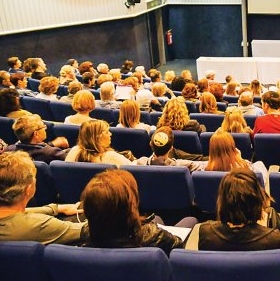News
SA Jews should look in the mirror for prejudice
Combatting anti-Semitism requires the Jewish community to root out elements of prejudice within itself. This was one of the proposals raised by a panel of academic and community leaders at Limmud last weekend.

MIRAH LANGER
“We are appealing to our worldwide Jewish community to look in the mirror to see whether there is any prejudice and racism within our hearts, before we ask the world to do the same,” said Edwin Shuker, the vice-president of the British Jewish Board of Deputies.
“A victim can’t fight the crime committed against him alone,” said Shuker, and therefore “Jews can’t fight anti-Semitism on their own”. This, he said, also meant that as Jews, we need to make sure that our engagement with others is meaningful.
His views were echoed by Haroon Moghul, a Fellow in Jewish-Muslim Relations at the Shalom Hartman Institute in Jerusalem. Moghul suggested that in a social context characterised by “quick talking points and scoring points against the ‘other side’, meaningful contact and engagement” should be emphasised.
“It’s as simple as exposing oneself to difference, and talking to people with whom one disagrees. It’s not about agreeing with them, but about trying to understand them on their own terms. It’s about introducing complexity and nuance into conversations that are often polarising,” said Moghul.
Professor Karen Milner, the national vice-chairman of the South African Board of Jewish Deputies, said this kind of engagement was crucial locally.
“As Jews – not in response to anti -Semitism – but as Jews who are citizens of this country, we need to engage in our country. [We should] engage in the civil problems in South Africa, and root out racism within our own community as well,” Milner said.
Furthermore, she pointed out that it’s important to remember that during a time when there seems to be somewhat of a “dimming of the rainbow nation”, what starts with Jews never ends with Jews. When other groups experience “othering”, such as the xenophobia against people from other parts of Africa, Jews suffer as well.
Jonathan Webber, a British-born, Krakow-based anthropologist, who has played a key role in Polish-Jewish relations, said it was also important to angle the manner of engagement with non-Jewish communities. “We should not dwell on negative issues of the past, even if they are perfectly valid. It’s unproductive. What we can do is help them [non-Jewish communities] reconnect with us. [We] should look for goodness in human beings. We must work with courtesy, respect, openness, and optimism for the sake of future generations.”
Webber gave a specific example of how successful engagement with people who were not Jewish led to strengthened alliances against anti-Jewish sentiments. In Poland, in response to the rise of the right and pockets of anti-Semitic rhetoric it preached, there had simultaneously been a rise in “anti anti-Semites”. These were young, non-Jewish Polish people who took it upon themselves to act against this kind of discrimination.
“They give cause for optimism. They join in dialogue, and want to learn about Jewish culture.”
Webber said this kind of “cultural diplomacy” becomes part of education, which studies have shown to lower – and even completely obliterate – prejudice like anti-Semitism.
Meanwhile, Shuker said, some of the work of forging connection needs to be conducted within the Jewish community itself. He gave the example of how many of the Jewish supporters of Labour leader Jeremy Corbyn started out as radical left-wing students who wanted to speak against Israel, and had thus been “excommunicated” from mainstream Jewish society.
“They are turning up again in universities and political parties. [As such], now we have to resolve the puzzle,” he said.
All the speakers raised concern about how Jewish and Zionist identity were positioned and connected with each other.
Milner, said that in South Africa, for example, it had led to the emergence of a troubling dichotomy between the idea of a “good and bad Jew”.
“When we maintain a certain attitude [to Israel], we are comfortable, and warmly welcomed. There is growing demand that to be ‘good Jews’, we need to cut our emotional, physical, psychological, and historical ties to Israel. Those that refuse to cut these ties are increasingly becoming seen as ‘bad Jews’.
“It leaves us with an odd dynamic in South Africa: a comfortable existence, but with this underling pressure and concern”, which has manifested blatantly in the recent past.